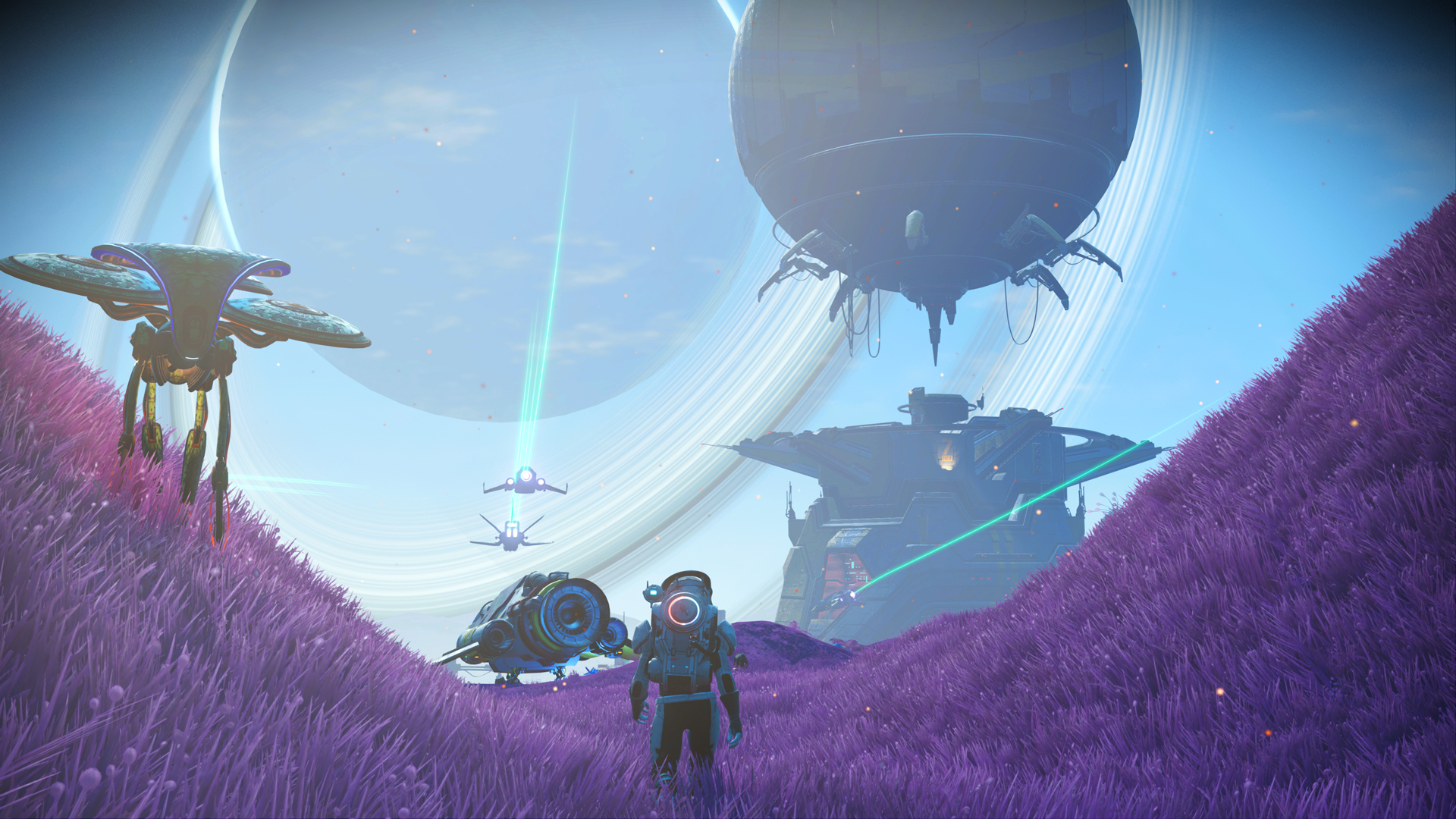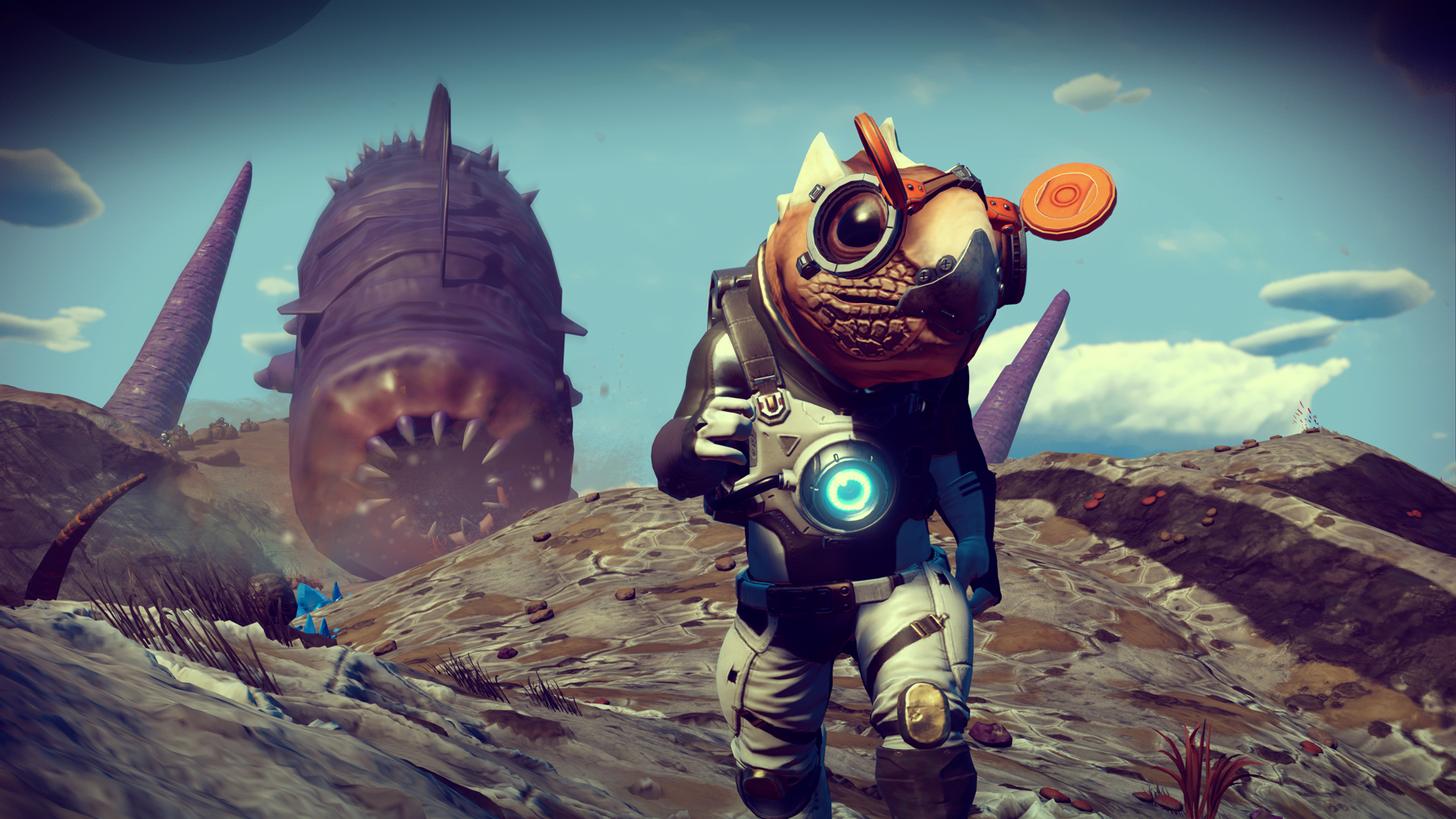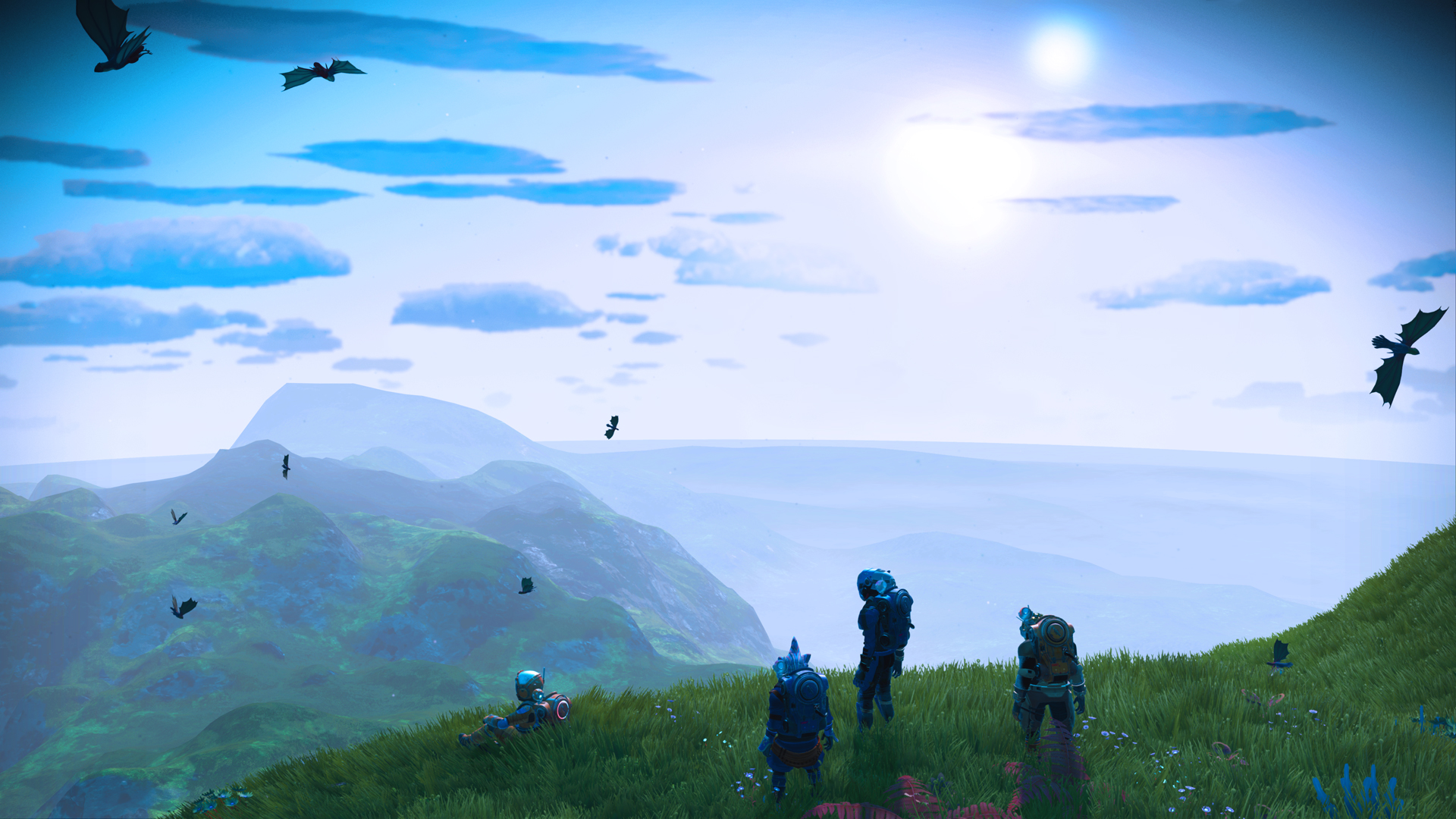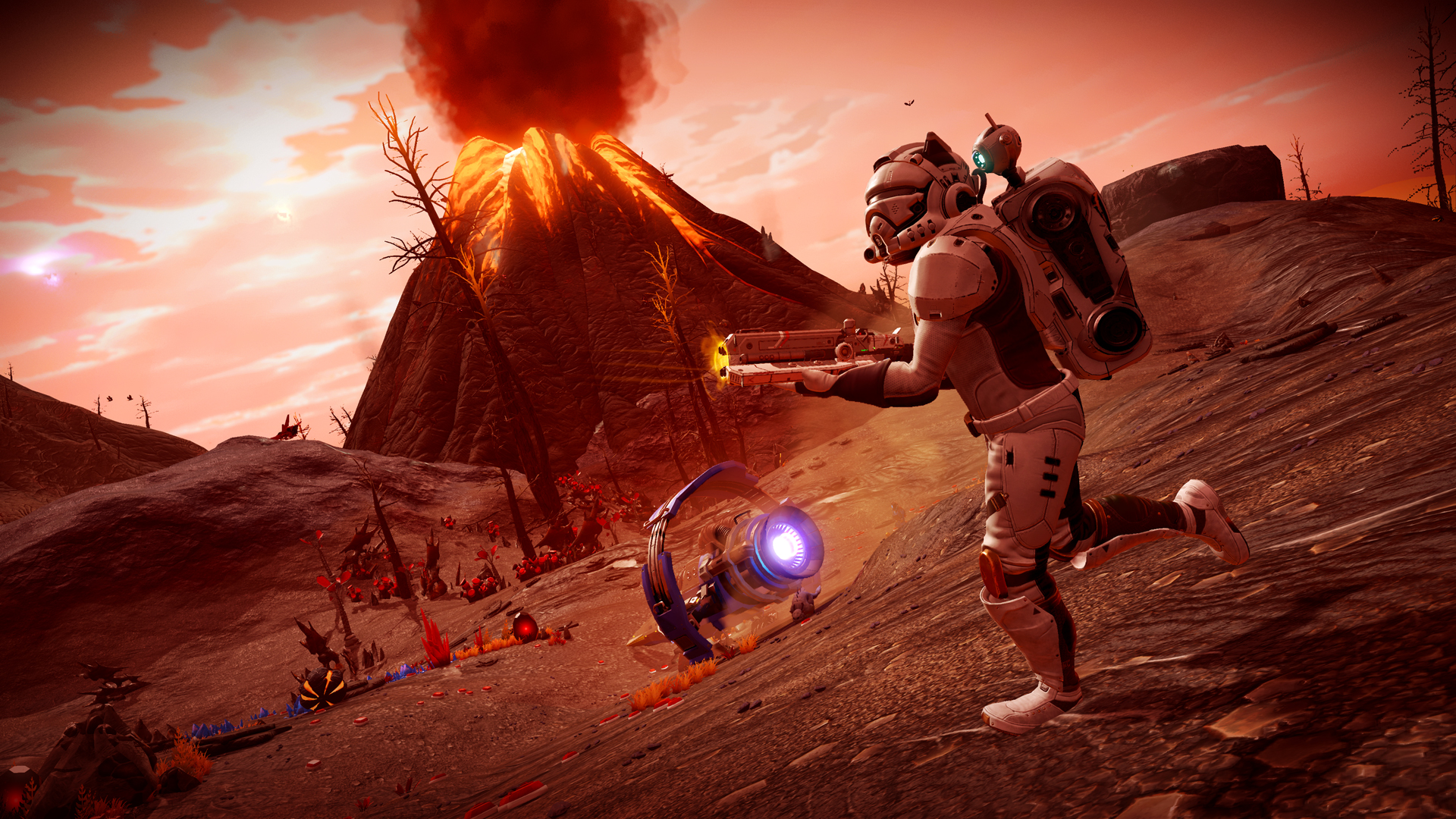
No Man's Sky: Origins is set to go live today. It's perhaps the most impactful expansion the space sim has enjoyed since its launch, introducing a whole host of changes to the underlying procedural generation in an effort to breathe new life to its universe. Speaking of new life, there's one new creature arriving that many of you have been asking after for quite some time now: the Sandworm.
The Sandworm infamously appeared in the 2013 reveal trailer, although it never materialised in the final game. Players spent years hunting it across a procedurally generated universe, with No Man's Sky director Sean Murray eventually confirming that the creature never made it to the live server shard because fleeing it was no fun at all. So, why the change of heart? "You know, we showed that in a trailer, like, three or four years before No Man's Sky came out. We were so naive then – so, so naive," says Murray.
The No Man's Sky Sandworm reemerges

I get the sense that Murray would love to tell me that it's been hiding in the universe this entire time, an ancient relic that was never discovered. But the truth is, the return of the worm is only possible because of No Man's Sky: Origins. This expansion is set to change the fundamental procedural generation, introducing millions of new and untouched planets for you and your friends to explore. The Sandworm is just one of the many, many new secrets to be found in a universe renewed.
"Back in early development, the Sandworms that we had looked cool but they weren't that fun. There were three or four decisions like this that needed to be made every day. And I didn't think much of those decisions – 'cut it then, if it's not fun'," Murray reflects, explaining that the Sandworm was excluded, ultimately, for the player's benefit. "Say you had hundreds of hours invested and your save was eradicated for no reason, just because the bloody Sandworm comes out of nowhere. That's not that fun, and I didn't think that anybody would miss them. That turned out to be a controversial decision."
Funnily enough, the players aren't the only ones that have been chasing the Sandworm for years. "About once every six months, somebody will bring me over to their desk and say… 'hey, we got the Sandworms working again!' Then other people will hear and everybody starts gathering around to see it," Murray says, noting that Hello Games' enthusiasm ultimately won out, and that balancing the Sandworm has been a great deal of work worth doing.
"It's been about trying to find a way to make sure that they're fair, that they are balanced, and that they are fun. That you're not playing permadeath with your 600 hour save and then the bloody Sandworm ends it all with no rhyme or reason. We've been matching them up to planets, making sure that you're warned about the existence of them – all these kinds of things," he says, adding, "they are more fun now and more infitting with the game."
New worlds to explore

If you go back and look at that 2013 reveal trailer – any of the trailers released ahead of the 2016 launch – I remember feeling like the entire universe was at our fingertips with No Man's Sky, the space travel possibilities endless. The pervasive power of those early trailers is palpable, even today.
Weekly digests, tales from the communities you love, and more
Everything Hello Games has achieved in the last four years has been made in an attempt to get a little closer to that original vision. There have been small additions such as rivers and ringed planets, to much larger ones, like multiplayer, virtual reality and crossplay support. Say what you will about the launch, but you can hardly fault the team for the work that came after. These have been changes made in service to the millions of players exploring the game, and Origins alters it even further. But for Murray, this isn't just about serving the needs of the community, but of recapturing that initial spark of wonder.
"I can look back [at the launch] now, and I can see that it was really an exciting time. Yes, we were seeing problems and things that we wanted to change, but we were also saying, 'Oh, I didn't know that existed. I didn't know things would quite look quite like that!' That was super cool. The reality is, I don't generally have that feeling day to day anymore. It's been four years; we know the rough shape and size of things. Yes, it's always a little bit different but, you know, I know the parameters within which people enjoy the game. We made this thing, we put it out there, and we've spent time over the last few years fixing things about that universe, but it's stayed pretty much static."
The No Man's Sky universe is expanding dramatically as a result. From today, intrepid explorers will find a more varied universe; deeper planetary diversity, bold new forms of terrain, new creatures, weather conditions, fauna, flora, volcanos, marshes, firestorms, and the list goes on thanks to No Man's Sky Origins. The studio has even increased the palette and variety of colours dealt out by the planetary generation, something that will no doubt come as welcomed news to the denizens of the No Man's High subreddit.

"It's like we are changing the foundations while people are still living in the house"
Sean Murray, Hello Games
The challenge, Murray explains, has been in attempting to bring changes to the simulation without disrupting what already exists. "It's like we are changing the foundations while people are still living in the house. People have thousand hours saves, they have built little villages and colonies, and have made discoveries and named them after their children," he continues. "And now we want to go and destroy and change [everything]. We've been trying to find a way to balance those two things. That's why it's called Origins," he says, adding, "we've kind of birthed new planets, millions of planets, into this existing universe."
"There's double the amount of variety, and there's loads of things that weren't technically possible, that people haven't seen before," he says, noting that these new planets include everything from mountains that can be kilometers tall to more complex formations of caverns, craters, chasms, rivers. All of it getting to the idea of discovery at the heart of the experience. "We needed to bring new planets in, in order to make that possible. It's been a cool problem to have. It's been a series of challenging little puzzles to try and figure out how to keep people's possessions, buildings, progress, discoveries, while, yes, making the places that they're discovering way more varied."
You'll want to check the No Man's Sky patch notes to see all of the additions and changes coming in the free Origins update today. It's kind of daunting, but then I'd expect nothing less from Hello Games – a studio that has spent four years tirelessly pushing back against criticism to create one of the more varied, populated, and exciting space simulations available.

Josh West is the Editor-in-Chief of GamesRadar+. He has over 15 years experience in online and print journalism, and holds a BA (Hons) in Journalism and Feature Writing. Prior to starting his current position, Josh has served as GR+'s Features Editor and Deputy Editor of games™ magazine, and has freelanced for numerous publications including 3D Artist, Edge magazine, iCreate, Metal Hammer, Play, Retro Gamer, and SFX. Additionally, he has appeared on the BBC and ITV to provide expert comment, written for Scholastic books, edited a book for Hachette, and worked as the Assistant Producer of the Future Games Show. In his spare time, Josh likes to play bass guitar and video games. Years ago, he was in a few movies and TV shows that you've definitely seen but will never be able to spot him in.


